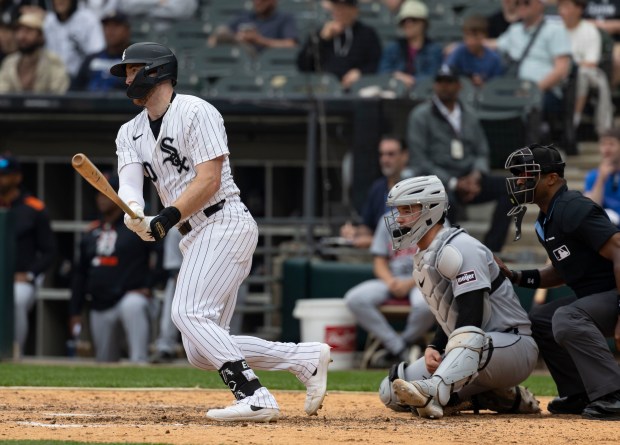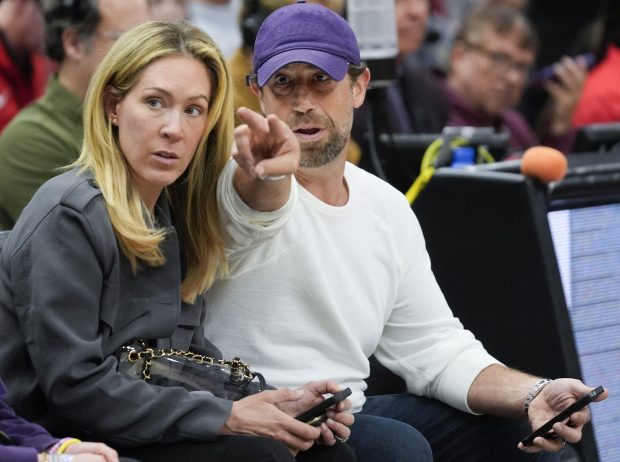“Archaic,” “discriminatory” and “dormant” were just a few of the words used by council members and the public to describe a Highland Park liquor license clause that prohibits elected officials from holding liquor licenses – a law that the mayor, councilmembers and city staff admitted to being unaware of until about two weeks ago.
Despite more than a dozen public comments in support of amending the law, three members of the Highland Park City Council voted to uphold the provision Monday night. Without a majority vote of four in favor of amending, the law will stay on the books.
Now Councilman Jeff Hoobler, who is also the co-owner of Ravinia Brewing Company, has to make a choice: to remain on the council he was elected to in 2023 or forfeit his liquor license and livelihood.
Hoobler’s liquor license, which he has maintained since before he was on the council, was recommended for renewal by city staff in late 2023 and subsequently signed by Mayor Nancy Rotering, who serves as the liquor control commissioner.
City Manager Ghida Neukirch and Rotering acknowledged mistakes and that an oversight was made when affirming Hoobler’s liquor license.
“One could say an error was made,” Rotering said during the council meeting. “This could be resolved by changing the existing law, but my feeling is that if we respond to violations of liquor laws by changing the law, particularly for a sitting council member, then frankly what’s the point of having the laws?”
However, the public and council members Annette Lidawer and Andres Tapias believe only Hoobler is facing the consequences of a collective error.
“The amendment proposed … rids us of a century-old exclusion and swiftly corrects our code. There is no compelling interest that this outdated law protects, which isn’t covered by the current, less onerous state law,” Lidawer said during the meeting.
The original law promotes exclusionary practices and limits who can run for office, Lidawer said in suggesting that is another reason to amend the clause.
To Hoobler’s understanding via his liquor license lawyer, he is the one who has to decide whether to close his business, move the business or resign from council – unless Rotering calls a hearing for the Liquor Control Commission to review the license.
Rotering said during the council meeting that she has no intention of revoking his liquor license or removing him from the council.
“The ball is in her court,” Hoobler said. “When she decides it is in her best interest to call a liquor license hearing she will call it; or if she decides it’s in her best interest to wait until the liquor license expires, that’s what she’ll do.”
The city’s Liquor Control Commission only met twice in 2023. The commission does not regularly meet to review liquor applications, but only convenes when there is a violation brought to its attention.
Hoobler was the top vote-getter in the 2023 election, and was also the only candidate on the ballot who was not publicly endorsed by Rotering.
The conversation around the liquor code clause comes while the Ravinia Brewing Company is facing a trademark infringement lawsuit from the Ravinia Festival. In a recent response complaint filed by the craft brewery in the U.S. District Court of Northern Illinois, the local pub denies all allegations brought forth by the music venue.
A blame game
The issue of Hoobler’s liquor license and business affiliation came about following a Committee of the Whole discussion around amending the city’s liquor code to expand license options on Jan. 29.
Hoobler did not learn of the liquor license ineligibility clause until a few days after the meeting.
“I do take responsibility,” he said. “I would have loved to know this ahead of time. In every profession, you rely on the experts. You rely on your lawyers. In this case, we rely on the city manager to know the ordinances in place.”
In conversations with the city’s corporation counsel Steven Elrod in May and June, Hoobler said he was advised by the attorney to err on the side of not recusing himself during conversations about the liquor code, and to provide his business knowledge to the Highland Park government.
“There were multiple discussions about the liquor code (because) staff wanted to review it,” Hoobler said. “During those discussions, I did nothing to promote my business. I did nothing that would be advantageous to my business.
“In fact, there’s a lady who actually wants to open a bar down the street from my business, and I’m one of her biggest supporters,” he continued. “And that is direct competition with my business.”
Rotering said the city did not go seeking the violation, but rather it was brought to her attention by residents who were concerned about a conflict of interest.
Highland Park Code of Ethics states council members should conduct themselves in a manner that prevents impropriety or the appearance of impropriety.
Neukirch expressed it was after the residents’ concerns that she also became aware of the ineligibility clause in the city’s liquor code.
In reviewing Hoobler’s liquor license renewal application, he appropriately checked the box that specifies he is a member of the City Council. The current iteration of the application does not specify in the question as to its purpose.
Neukirch said she originally thought it was a question of disclosure, not a question of ineligibility.
The Highland Park council had the opportunity to amend the clause and allow elected officials to possess liquor licenses – a motion that was made by Lidawer, and supported by Tapias and Councilmember Yumi Ross.
Councilmembers Anthony Blumber and Kim Stone, along with Rotering – who also make up the Liquor Control Commission – voted against the amendment.
Because Hoobler recused himself from the discussion and vote, the tie vote failed to amend the text.
“I am grateful beyond belief to have that public support,” he said. “It’s also embarrassing that the public support made no difference to these three people.”
Hoobler said Monday night’s vote distracts from the mistakes of the city, and makes him into a scapegoat.
Attempts to reach Rotering and Neukirch for comment after the meeting were unsuccessful.
State law vs. local law
After the prohibition era in 1934, Illinois state law prohibited elected officials and law enforcement officers from holding liquor licenses – which is how the law came into effect in Highland Park and other municipalities.
However, in 2001, the state amended the clause to allow liquor licenses for elected officials and law enforcement for cities with a population of 50,000 or less. In 2013, it was amended again for populations of 55,000 or less. State law also specifies that liquor establishments by elected officials or law enforcement must also have a food service.
Since the state’s amendment, municipalities in Illinois have changed their local laws, including at least eight cities near Highland Park, according to a 50-city study conducted by Highland Park’s corporation counsel.
In the neighboring city of Highwood, current councilmember Eric Falberg maintains and liquor license and operates a local distilling company. Falberg was elected to the council in 2009 and opened his business in 2017.
In Highwood, there is no clause barring elected officials from holding liquor licenses.
When Falberg opened his bar, he said discussions were mutually initiated by himself, city staff and corporation counsel to discuss recusal and proper conduct during council business.
“City attorneys are there to recommend and protect council members from our own stupidity,” Falberg said. “Someone should have protected Hoobler.”
Falberg said he recuses himself from discussion and votes anytime alcohol is on the Highwood agenda, whether it is a code amendment or liquor license.
“(The code) is an easy thing to change, and it should have been changed to protect a council member who is already on the council,” Falberg said of the Highland Park situation.





